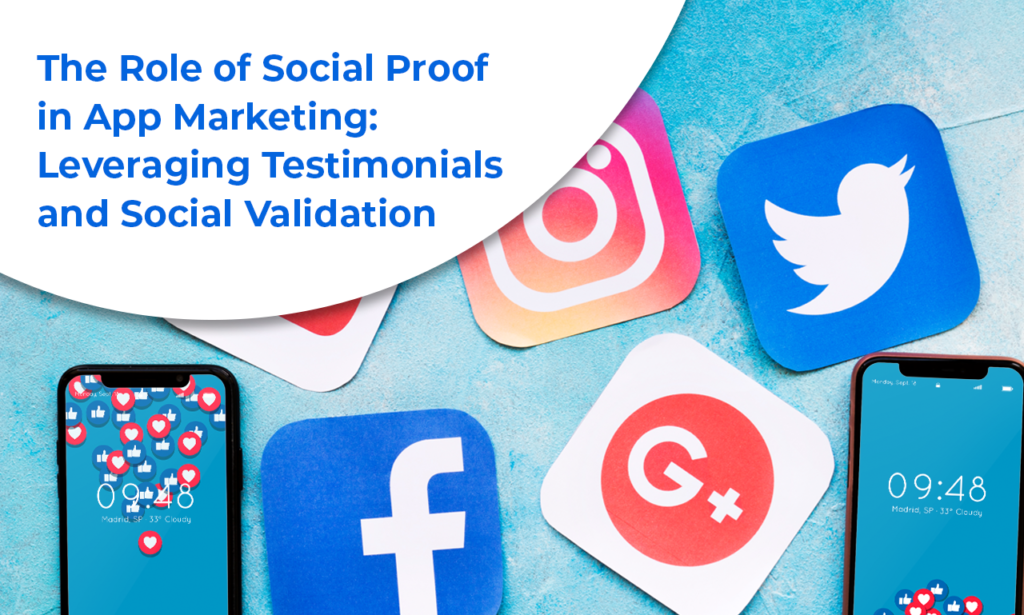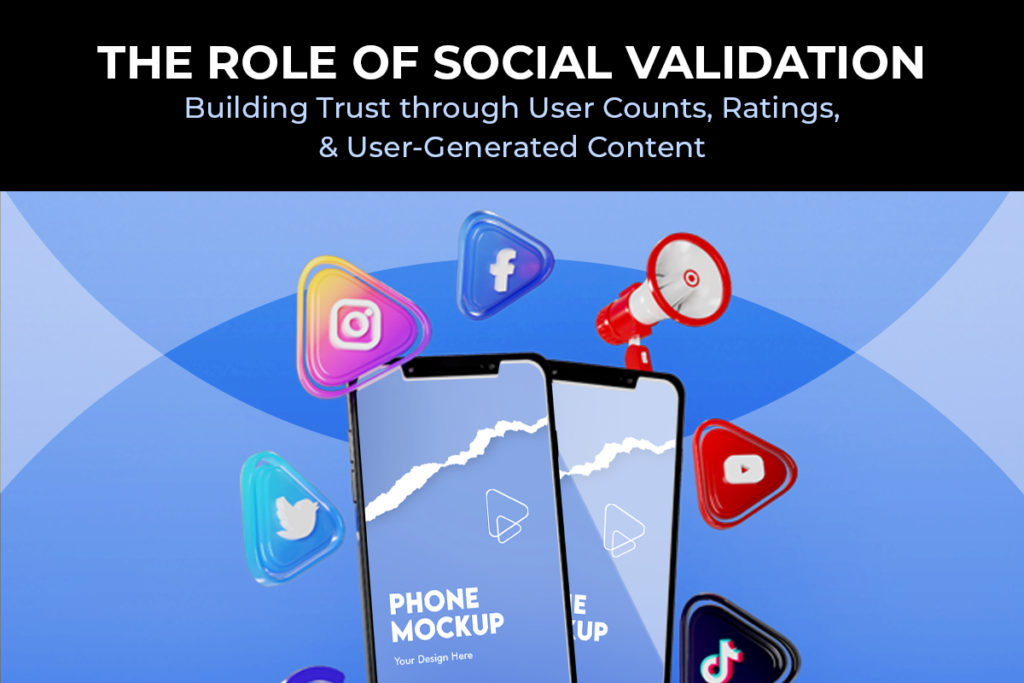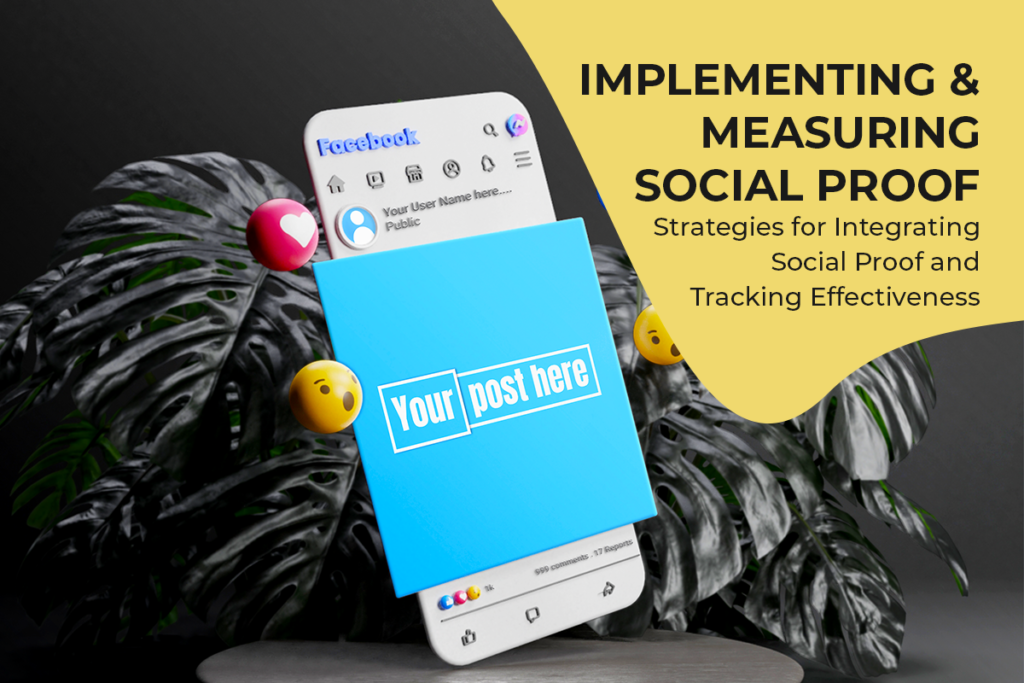
The Role of Social Proof in App Marketing: Leveraging Testimonials and Social Validation
In the fast-paced and highly competitive world of app marketing, there’s a force that often goes unnoticed but wields tremendous influence—social proof. It’s the secret ingredient that can turn curious browsers into dedicated users. Social proof is the power of validation, the unspoken consensus that makes individuals trust what others endorse. In this article, we’ll embark on a journey to uncover the pivotal role of social proof in app marketing and explore how leveraging testimonials and social validation can significantly impact user trust and, ultimately, the success of your app.
In a landscape flooded with apps vying for attention, the sway of social proof is undeniable. It’s the magnetic pull that draws users in, reassuring them that they’re making a wise choice by choosing your app. This validation isn’t based on empty promises or self-praise; it’s rooted in the voices of those who have gone before, tested, and embraced your app.
With the rise of the digital age, the psychology behind social proof has gained more prominence than ever. Users instinctively look to others’ experiences as beacons of guidance in the digital wilderness, be it in selecting a new app, booking a restaurant, or even choosing a vacation destination. We’ll delve into the psychology of social proof, its compelling impact on user behavior, and why it plays a central role in the success of app marketing.
Section 1: Understanding Social Proof

Explore the core principles of social proof and its psychological impact. You’ll gain a deeper understanding of how it influences users’ decisions, fosters trust, and drives app success. We’ll unravel the psychology behind social proof, its various forms, and how it shapes user behavior in the app market.
Social proof is rooted in the human tendency to mimic others when faced with uncertainty or choices. It’s a powerful force that guides user decisions in the complex app landscape.
Social proof is not just a passive phenomenon; it’s a dynamic tool that can enhance your app’s credibility, build trust, boost engagement, and influence your app’s visibility in app stores. When used effectively, social proof becomes a guiding light in your app marketing journey.
1.1 The Power of Social Proof
Social proof, at its core, hinges on influencing human behavior. It is rooted in a fundamental psychological principle: people often seek guidance from others, particularly in situations where they face uncertainty or need to make decisions. In the realm of app marketing, social proof manifests as the concept that users tend to be more inclined to download, engage with, and trust an app when they perceive it as having been validated and appreciated by a collective audience.
Defining Social Proof and Its Psychology
Social proof assumes various forms, including user reviews, testimonials, app ratings, download statistics, and endorsements from notable figures. The psychology underpinning social proof draws from several core principles:
- Herding Behavior: At its core, social proof leverages the innate human tendency to mimic the actions of others. When users observe that an app boasts a substantial number of downloads or garners positive reviews, they are more inclined to follow suit, often perceiving it as a “safe” or wise choice.
- Building Trust: The presence of favorable feedback from fellow users cultivates a profound sense of trust in your app. This trust plays a pivotal role in influencing users’ decisions to download, install, and interact with your application.
- Mitigating Uncertainty: Users frequently encounter a sea of options when navigating app stores. Social proof serves as a navigational compass, reducing the ambiguity tied to app selection by furnishing empirical evidence of an app’s worth.
- Cognitive Facilitation: Social proof streamlines the decision-making process. When users recognize that others have already vetted and endorsed an app, they find it easier to arrive at swifter, more confident decisions.
The Significance of Social Proof in App Marketing
In the dynamic realm of app marketing, characterized by cutthroat competition and ephemeral user attention spans, social proof operates as a potent catalyst. Its influence extends beyond the mere attraction of users—it fosters confidence, leading to heightened user acquisition and retention rates.
The importance of social proof in app marketing can be succinctly articulated through the following facets:
- Establishing Credibility: By showcasing testimonials, ratings, and user counts, your app secures a mantle of credibility. Users are naturally inclined to trust and engage with an app that radiates authenticity and reliability.
- Cultivating User Trust: Social proof nurtures trust in your app’s capabilities. The sight of others reaping the benefits of your app generates a ripple effect of trust among potential users, priming them for action.
- Driving User Engagement: User engagement commences with the decision to download an app. Social proof serves as the decisive nudge that lures more users, thereby augmenting user engagement.
- Securing App Store Success: App stores algorithmically weigh user ratings, reviews, and download statistics. A wealth of positive social proof augments the likelihood of your app being featured and recommended.
Section 2: Testimonials and Reviews

Embark on an exploration of pragmatic strategies to harness the formidable power of social proof. We’ll delve into the profound impact of user testimonials, uncover the art of adroitly managing user reviews, and underscore the significance of social validation facilitated through user counts and ratings. The journey begins, where we unlock the full potential of social proof to invigorate your app marketing endeavors. Let’s navigate the realm of testimonials and social validation, mastering how to harness them most effectively.
2.1 Harnessing the Voice of Users
When it comes to establishing trust and credibility in the app market, user testimonials play an instrumental role. In this section, we’ll explore the impact of user testimonials on potential users and how they can be harnessed to create a compelling narrative for your app.
The Impact of User Testimonials
User testimonials serve as authentic voices that vouch for your app’s value and quality. They are a direct reflection of your app’s impact on users’ lives and can significantly influence prospective users. The impact of user testimonials is multi-faceted:
- Validating Claims: When a user shares a positive experience, it reinforces the promises made about your app’s functionality, creating an immediate sense of reliability.
- Overcoming Skepticism: By providing real-world evidence of your app’s effectiveness, testimonials help bridge the initial gap of skepticism that many potential users may have.
- Building Relatability: Users often find common ground with other users. Testimonials foster a sense of belonging and trust, creating a more inviting environment for potential users.
- Eliciting Emotions: Well-crafted testimonials can evoke emotions, creating a stronger bond between users and your app and fostering a deeper connection.
- Highlighting Unique Features: They can also emphasize unique selling points (USPs) that may not be immediately apparent through conventional marketing channels, setting your app apart in a competitive landscape.
Managing User Reviews for Trust Building
While user testimonials can significantly bolster your app’s credibility, effectively managing user reviews and feedback is crucial in maintaining trust and authenticity. Key practices include:
- Promoting Transparency: Encourage genuine feedback from users to cultivate an environment of transparency and credibility.
- Engaging Responsively: Actively engaging with users who leave reviews, whether positive or negative, demonstrates your commitment to understanding and addressing user concerns.
- Addressing Concerns Promptly: Taking the initiative to promptly address any issues raised by users not only helps the user in question but also showcases your dedication to enhancing the user experience.
- Guarding Against Inauthenticity: Be vigilant in identifying and addressing any fake or spam reviews, as they can erode trust and credibility, thereby undermining the impact of authentic testimonials.
In summary, user testimonials are a compelling form of social proof that can have a profound impact on your app’s success. Managing them effectively and nurturing an environment of honesty and transparency is key to harnessing their potential.
2.2 Encouraging User Testimonials
Encouraging user testimonials is a proactive approach that can have a substantial impact on your app’s credibility and user trust. In this section, we’ll delve into effective tactics and techniques for soliciting user feedback and testimonials.
Strategies for Soliciting User Feedback
- In-App Prompts: Implement unobtrusive in-app prompts that nudge users to share their thoughts and experiences. Timing these prompts when users reach significant milestones or have engaged with your app for some time can yield positive results.
- Email Campaigns: Craft well-structured email campaigns that politely request user feedback and testimonials. Make it clear how valuable their input is in improving the app.
- App Store Prompting: Make use of app store review prompts designed to kindly ask users to rate and review your app. Ensure the process is user-friendly, respecting their time and experience.
- Incentives and Rewards: Consider offering small incentives or rewards to users who provide testimonials. These incentives might include discounts, exclusive access, or other perks, creating a mutually beneficial arrangement.
- Two-Way Communication: Foster a sense of community by actively engaging with your users. When users perceive that their opinions are heard and valued, they’re more likely to reciprocate with constructive feedback.
Incentivizing and Recognizing User Testimonials
- Recognition: Showcase user testimonials prominently on your app’s landing page or relevant sections. Recognizing your users’ contributions serves a dual purpose—validating their efforts and underscoring the authenticity of the testimonials.
- Social Media Shoutouts: Acknowledge users who provide testimonials on your social media platforms. This not only publicly acknowledges their support but also motivates other users to participate and share their experiences.
- Contests and Prizes: Organize contests or campaigns that encourage users to submit testimonials, with the opportunity to win prizes. This gamification of the process can generate a higher volume of responses.
- Exclusive Features: Offer users exclusive features or access in return for their testimonials. These unique offerings can serve as an additional incentive for users to contribute their experiences.
- Continuous Engagement: Maintain an open channel for ongoing communication with users who provide testimonials. This not only nurtures a loyal user base but also ensures a consistent stream of valuable testimonials.
Encouraging user testimonials is a valuable practice for enhancing your app’s authenticity and trustworthiness. By applying these strategies, you can actively engage your user community, motivating them to share their experiences and thereby enriching your app’s social proof.
Section 3: The Role of Social Validation

In the digital age, social validation plays an integral role in shaping users’ perceptions and influencing their choices. As we explore the importance of social validation in app marketing, we’ll examine the key aspects that make it a potent force.
3.1 Building Trust with Social Validation
Trust is a valuable currency in the competitive realm of app marketing. Apps that establish trust with their users tend to witness higher adoption rates, more active engagement, and long-term success. One critical element in building this trust is social validation, acting as the bridge between your app and potential users.
The Influence of User Count and Ratings
When a user first encounters an app’s download page, one of the primary aspects they scrutinize is the app’s rating and the total number of users who have shared their thoughts. These two pieces of information are quick indicators of the app’s trustworthiness and quality.
High ratings coupled with a substantial user count send a strong message to potential users. It suggests that the app has been tried, tested, and endorsed by a significant number of people. This social validation holds the power to sway users who are looking for reassurance that your app is worth their time and device storage.
To maximize the impact of user count and ratings, app marketers should:
- Actively Encourage User Ratings and Reviews: Interact with your users within the app, urging them to leave positive reviews and high ratings if they’re satisfied with the service. Furthermore, prompt users to express their thoughts on app stores, as these reviews have a high visibility to potential downloaders.
- Showcase User Count: If your app boasts a substantial user base, consider prominently displaying this number on the app’s landing page or download page. Phrases like “Join millions of satisfied users” can have a profound impact on visitors.
- Address User Feedback: An app’s rating is not set in stone. Consistently monitor user reviews and ratings, and take constructive feedback seriously. By addressing issues, making improvements, and communicating these changes, you demonstrate to users that their opinions matter.
User-Generated Content as Social Proof
User-generated content encompasses authentic and persuasive social proof. It comprises user testimonials, reviews, comments, and even user stories, and it carries significant influence in shaping the perceptions of potential users. By providing unfiltered insights into the app experience, user-generated content creates an aura of authenticity and trust.
Human nature inclines us to seek opinions and feedback from our peers. When users encounter favorable testimonials, they receive endorsements from fellow users. On the other hand, even constructive criticism and suggestions can serve as evidence of an app’s dedication to ongoing improvement and user satisfaction.
To effectively leverage the power of user-generated content:
- Active Encouragement: Encourage and facilitate your users to share their experiences. This can be done through in-app prompts, email campaigns, or by creating specific sections for users to contribute their stories.
- Showcase User Testimonials: Display user testimonials prominently on your app’s website, landing page, or marketing materials. These endorsements carry significant weight and can be the deciding factor for users who are on the fence.
- Engage with User Comments: Engage with users who take the time to share their experiences in the form of comments or stories. Acknowledging their contributions builds a sense of community and appreciation for user involvement.
User-generated content represents a potent source of social validation. As users frequently base their decisions on the experiences and opinions of their peers, tapping into this resource effectively can significantly enhance trust in your app.
Section 4: Implementation and Measurement

In this section, we’ll focus on the practical side of incorporating social proof into app marketing and gauging its effectiveness. This part provides essential strategies for app developers and marketers aiming to infuse trust-building elements into their app profiles and expand these practices into their marketing endeavors. Topics include optimizing app store descriptions and producing compelling testimonial videos, offering actionable insights for leveraging the potential of social proof. Moreover, it emphasizes the significance of monitoring results, allowing continuous enhancement of social proof tactics. In today’s competitive app environment, mastering the implementation and measurement of social proof can significantly impact an app’s success.
4.1 Integrating Social Proof in App Marketing
Integrating social proof in app marketing involves strategic placement and optimization of user testimonials and social validation across various channels. From app store descriptions to social media campaigns, the implementation of social proof plays a critical role in enhancing user trust and driving app adoption.
Placing Testimonials and Social Validation in App Stores
The app store is a primary touchpoint where users engage with your app’s brand. Implementing social proof in this space requires careful consideration and strategic placement. Key strategies to effectively place social proof within app stores include:
- Optimized App Descriptions: Craft compelling app descriptions that include snippets of user testimonials and ratings. Highlighting positive user experiences within the app description can significantly influence download decisions.
- Visual Testimonials: Where applicable, include visual testimonials in the form of screenshots or short video snippets, showcasing user experiences or positive feedback. Visual content is more likely to capture the attention of potential users.
- Featured Reviews: App stores often provide the option to feature selected user reviews. Choose positive reviews that highlight the key benefits and strengths of your app, ensuring they are visible to users during their decision-making process.
Using Social Proof in Marketing Campaigns
Beyond app stores, integrating social proof into marketing campaigns amplifies the trust-building process and broadens the app’s reach. Various methods can be employed to effectively leverage social proof in marketing campaigns:
- User Testimonial Videos: Create engaging user testimonial videos that feature satisfied users discussing their positive experiences with the app. Video content is highly engaging and has a strong impact on potential users.
- Social Media Promotion: Share user testimonials and positive reviews across social media platforms to build a positive perception of your app. This strategy also encourages user engagement and interaction, fostering a community around your app.
- Email Marketing with User Stories: Incorporate user stories and testimonials in email marketing campaigns. Personalized stories and positive experiences shared by users can significantly enhance the effectiveness of your email marketing efforts.
By strategically integrating social proof across app stores and marketing campaigns, app developers and marketers can build a robust foundation of trust, encouraging higher adoption rates and improved user retention. The successful implementation of social proof not only boosts app downloads but also creates a community of satisfied users who advocate for the app’s value and benefits.
Conclusion
Social proof is a force to be reckoned with in the world of app marketing. It holds the key to building user trust, enhancing app credibility, and ultimately driving success. This article has delved into the various facets of social proof, from understanding its psychological underpinnings to harnessing the voice of users through testimonials and reviews. We’ve explored the power of social validation, encompassing user counts and ratings, and user-generated content.
App developers and marketers now possess the knowledge and tools needed to infuse their marketing efforts with the persuasive influence of social proof. From this vantage point, we recognize the central role that social proof plays in the modern app ecosystem. It’s not merely a nice-to-have; it’s a must-have.
As the digital landscape continues to evolve and competition within app stores intensifies, the ability to leverage social proof effectively becomes paramount. Success isn’t merely measured by downloads or installs; it’s defined by the ability to build trust and maintain it. Social proof stands as a beacon in this pursuit, illuminating the path to enhanced user acquisition, engagement, and retention.
In a world inundated with apps, social proof serves as the lighthouse, guiding users to their preferred destinations. As we look forward, it’s clear that the role of social proof in app marketing is set to grow in importance. New technologies and innovative strategies will continue to reshape the way we harness social validation. With this knowledge, app developers and marketers can confidently set sail into an era of trust-building, knowing they have the power of social proof on their side.
Please feel free to Contact Us in case you need any guidance regarding your app marketing needs.
FAQ
How can app developers handle negative reviews and testimonials?
App developers should view negative reviews as opportunities for improvement. Address these reviews promptly and professionally, showing a commitment to resolving user issues. Constructive criticism can lead to valuable app enhancements.
Are there legal considerations when using user testimonials in app marketing?
Yes, there are legal considerations, particularly concerning the use of authentic user testimonials. Ensure that the testimonials are genuine and represent real user experiences. Be transparent about any incentives or rewards offered in exchange for testimonials to avoid legal complications.
What are some real-world examples of successful social proof implementation?
Many apps have achieved success through social proof. Airbnb, for example, utilizes user reviews and ratings to build trust among its users. Amazon showcases user-generated reviews, and Uber often offers social validation through ride counts and driver ratings.
How can app marketers balance authenticity and user trust in testimonials?
Maintaining authenticity is crucial. User testimonials should reflect real experiences with the app. Users can quickly detect inauthentic testimonials, which can damage trust. Encourage genuine feedback without manipulation.
Can social proof be beneficial for both established and new apps?
Absolutely, social proof benefits apps at all stages. For new apps, it’s a trust-building tool, while established apps use social proof to maintain user trust and attract new users. The form of social proof may vary but remains relevant.
What impact does social validation have on user behavior within apps?
Social validation significantly influences user behavior. High ratings, user counts, and testimonials can boost user confidence, leading to increased downloads, engagement, and conversions. Users often follow the crowd, making social validation a potent driver of actions.
How often should app developers update their social proof strategies for better trust-building?
Regularly reviewing and updating social proof strategies is vital. As user feedback evolves and app features change, social proof should reflect these shifts. Ensure that testimonials and reviews stay relevant and up-to-date.
Are there ethical considerations in incentivizing user testimonials?
Yes, there are ethical considerations. Incentivizing user testimonials should be done transparently and responsibly. Ensure that incentives do not compromise the authenticity of the testimonials and that users are fully aware of any rewards they might receive.
Can app store reviews alone provide sufficient social proof for an app?
While app store reviews are an essential source of social proof, a comprehensive social proof strategy should encompass a variety of elements, including user counts, ratings, testimonials, and user-generated content. Collectively, these elements offer a more robust trust-building foundation.
What are the best practices for encouraging and showcasing user testimonials?
The best practices include actively soliciting user feedback, incentivizing genuine testimonials, and prominently showcasing them within the app and on app store listings. Encourage users to leave feedback and highlight positive testimonials to maximize their impact.




0